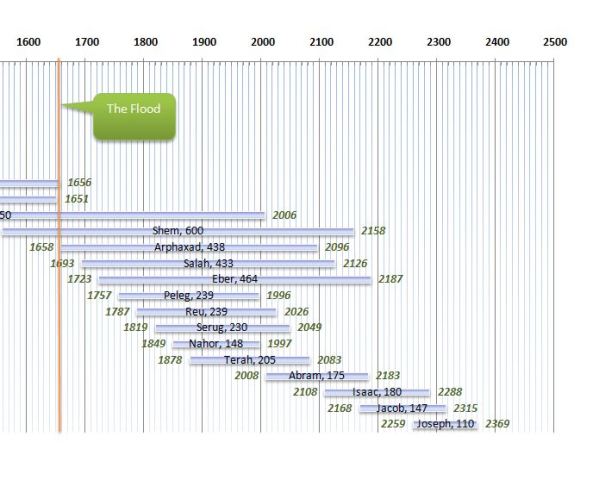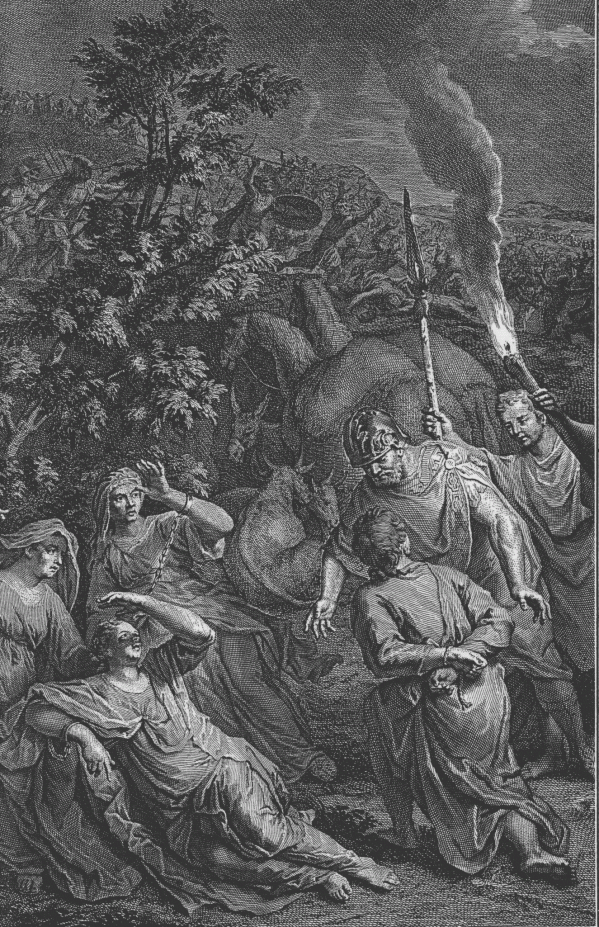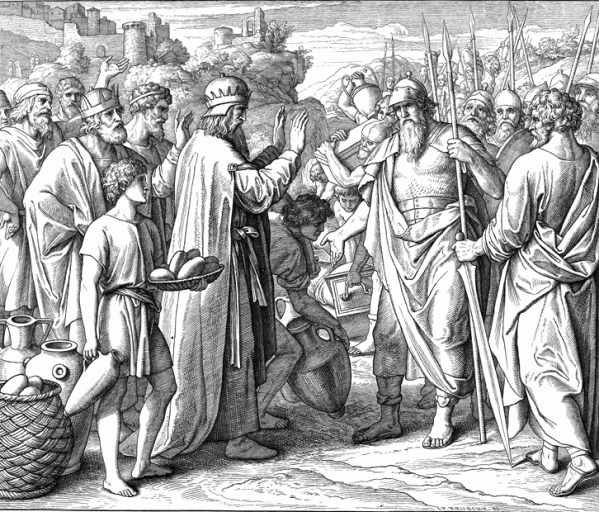This is an incredibly interesting chapter. The faith that Abram displays shows that he is a true worshiper of the Lord. We also see our first biblical battle. In the Ancient Near East, there would often be city-states that would be vassals of some other greater city-state. These vassals would be required to pay tribute in exchange for protection and to remain in control of their own lands. Failure to pay this tribute was equivalent to rebellion and usually resulted in military action. That is exactly what happens in chapter 14.
There were four kings, Amraphel, Arioch, Chedorlaomer, and Tidal who joined together to make war on five kings who had rebelled against Chedorlaomer. They were vassals for twelve years, but rebelled on the thirteenth refusing to pay their tribute. These kings who rebelled were Bera (king of Sodom), Birsha (Gomorrah), Shinab, Semeber, and the king of Bela (also called Zoar). The next year, Chedorlaomer and his allies attack in retribution for failure to pay the tribute. The five kings banded together but were defeated. The four kings took possession of all the goods of Sodom and Gomorrah, and all their provisions, and then began making their way home. Unfortunately, Lot and his his goods were also taken.
Someone escapes the devastation and tells Abram “the Hebrew”. Let’s stop here. This is the first mention of Hebrew in the Bible. What does it mean? It refers to descendants of Eber. Turn back to chapter 11 and check out verse 16. Eber is a descendant of Shem. For some reason, of the long line of descendants, Eber is the one Abram’s descendants are identified with. This does show that the genealogies presented earlier were of some special significance not only to those particular families, but others identified Abram ad his descendants as Hebrews as well. This news Abram hears about the capture of his nephew sets off some intriguing events. First, we learn that Abram has allies. Remember, Abram is a herdsman. He does have some power and seems to be quite well-off, but he is not the king of any nation. He lives off the land. Secondly, these allies are Amorites, a people group who would become the enemies of the people of God. We also learn that Abram has three hundred and eighteen trained servants who are essentially soldiers.
Abram sends these servants in pursuit of Lot. They catch up to the four kings, and Abram divides his forces by night. Abram along with his servants attack them and pursued them. We do not know the exact details of the battle other than the fact that Abram and his servants seem to have won not only the battle, but have repossessed all the possessions and people who were taken by the five kings. Most importantly, Abram has rescued Lot. It seems that this was the main purpose of this mission. The incredible part is that 318 men and Abram were able to defeat four kings. This was truly a miracle directed by the hand of God.
The king of Sodom went out to meet him. I’m imagining a rather meek king who realizes he has lost everything and is trying to find some way to get back in control. How could this king of so decadent of a city be so humiliated? A simple herdsman from the hill country was able to defeat the four kings who had plundered his great city. This king of Sodom is insignificant in comparison with Abram. We are then introduced to a king who is not insignificant: Melchizedek.
It is important to know that there are many things we do not know about Melchizedek. This can make him seem to be more allegorical or mythical. However, I would argue this was a real person. His role takes on a whole new meaning in the New Testament as a sort of proto-Christ. However, let’s look at what we do know. Melchizedek means “righteous king”. Salem means “peace”. Salem would later be called Jeru[S]alem. He is also a true worshiper of “God Most High”. Melchizedek is also a priest. In almost every nation at that time, the role of king and priest and two separate and distinct roles. However, in Salem, they are intricately wrapped up in one person. This is unique. This is one way in which he is a proto-Christ. In Jesus, we have a great High Priest, who just so happens to also be the King of Kings. The Old Testament has a way of foreshadowing events that will take place in the New Testament, but often in surprising and extraordinary ways. Christ is not just a priest and a king. He is sitting at the right hand of the Father constantly mediating on our behalf. He is not king of just one nation, or even just the Earth, but he is sovereign over every atom of the universe, which he created and sustains by his absolute power. His sovereignty is unquestionable.
This Melchizedek brings an offering of bread and wine. Christians know the significance of this, though I would imagine the theological truths we see in Communion were not known to Abram or Melchizedek. Revelation is progressive, but as I said, the Old Testament foreshadows events in the New Testament, often without the audience knowing that events they are living through foreshadow anything. I would imagine that Abram and and Melchizedek would have been surprised to learn just what that bread and wine would come to symbolize. However, this offering distinguishes God from other gods of the time. Melchizedek blesses Abram and gives credit for his victory to God.
We do not know of the relationship between Abram and Melchizedek before this time, which could have been nonexistent, but Abram recognizes a true worshiper of God and gives him a tithe of all the spoils he has received from the five kings. Things are going quite well, and then the king of Sodom decides he doesn’t like seeing his stuff given away. He requests that Abram give him his people back and keep his possessions, presumably so he can keep something (his rule) and be rid of Abram who is clearly the big dog in town now. Abram’s response shows that his faith has been growing when he rejects the king’s offer. This is a pivotal event in the life of Abram. Why? Because though he has been wealthy and powerful within his own circle pretty much since he has left Ur, this is the first time Abram has any geopolitical significance apart from his brief encounter and unceremonious departure from Pharaoh. He has just defeated four very powerful kings who had already shamed five others. Now he is being blessed by yet another king, giving away spoil, and kings are grovelling at his feet begging for their possessions back. At this point, it seems God has already delivered on his promise by making him the most powerful man around. He could easily take possession of these lands and that would be that. But that is not what Abram does, lest kings should say, “I have made Abram rich”. Abram wants to make sure that God gets the credit.
So instead of taking the possessions, Abram returns them to their former owners. The only thing he takes is food to feed his men, having successfully rescued Lot and his possessions. Furthermore, he slights the king of Sodom by telling him that he would not accept even a thread or sandal strap from him. The wickedness of Sodom demanded that Abram not treat with this king as an equal. He returns the wicked king’s possessions and will wait for God’s timing to deliver on His promise. Abram, though still quite flawed, is beginning to learn that God’s glory is not something he can help God earn; God will accomplish it Himself. Abram will become impatient in the future as he waits on God for an heir, but at least at this time, he allows God to receive the glory and takes a backseat.
As a side note, I found some out some interesting things while researching for this post. The first thing that I found out was that Shem was still alive during the events described above. I’ll post a picture below to help visualize the timeline. This is much like Adam being around during Noah’s father’s lifetime (Lamech). The second thing I learned is less of a fact and more a conjecture. Some people speculate that Melchizedek may have in fact been Shem. Shem lives in the same area Melchizedek lives. He would clearly be the wisest and oldest person around those parts. As such, he would likely have leadership (if he wanted it). We also know that Shem was a worshiper of God, like Melchizedek. I would not claim that I hold to this theory, but I would definitely say it seems plausible. How much more interesting this meeting of Melchizedek and Abram becomes if it is a meeting of the same family many generations apart. Either way, people in the ancient world would have been able to meet those who had seen the pre-flood world firsthand. 


This is interesting. I’m just now reading Hebrews and was looking for an image for my blog post at http://amybibleblog.blogspot.com/ Melchizedek has always been a mystery as has, for that matter, the Letter to the Hebrews! I’ll come back to take a look at more of your posts–seem quite a bit more extensive than mine.
Hey, sorry it took me so long to reply. I took a brief break from blogging and just now saw your message. Thanks for the encouragement. Melchizedek has always seemed a shadowy figure to me, but incredibly intriguing. Hope some of what I wrote helps, but to be honest, I’m still in the dark too.